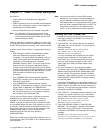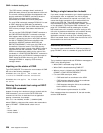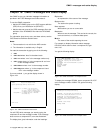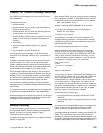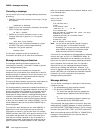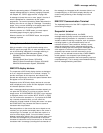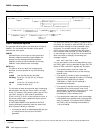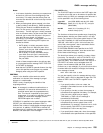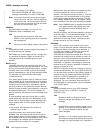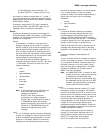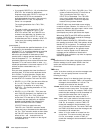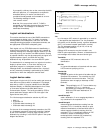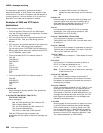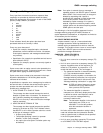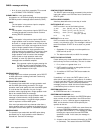
CMSG—message switching
Notes:
1. In all cases, the delivery time that you request must
be less than 100 hours from the beginning of the
current day. This means that the delivery time can
never be later than 03.59 on the fourth day from the
current day.
| 2. When processing date options entered in the form
| yy.ddd, mm/dd/yy and dd/mm/yy, CMSG operates a
| 'sliding 50 year window' to establish whether the
| year is in this century, the previous century or the
| next century. The two digit year is initially assumed
| to be in the same century as the current date. If this
| assumed year is more than 50 years in the past or
| more than 50 years ahead, it is adjusted
| accordingly. For example, if todays date is the 31st
| December 1997, the following DATE options are
| handled as follows:
| DATE=99.001 is initially assumed to be the
| year 1999. Since it is within 50 years of the
| system
1
year, the year 1999 is determined to be
| the delivery date for the message.
| DATE=00.001 is initially assumed to be the
| year 1900. Since this year is more than 50
| years ago, the delivery date is established as
| the year 2000.
| In both of these examples above, the delivery date
| is not accepted and the message 'DATE TOO FAR
| IN FUTURE' is displayed.
| Note that the FULLDATE operand allows a four digit
| year to be specified, and removes any possible
| ambiguity when using the DATE operand.
ERRTERM
“termid” is the identifier of the terminal to which
notification is to be sent if the message is purged
because it is undeliverable.
ORIG is a way of specifying the identifier of the
originating terminal.
Note: A message is considered undeliverable to a
destination if it cannot be delivered within a
specified interval after the requested delivery
time. This interval is specified by the system
programmer. If no interval is specified, no action
is taken for undelivered messages, and the
ERRTERM option has no effect.
If PRGDLAY is specified in the system initialization table
(DFHSIT), the transient data destination CSMT is
notified of the number of undeliverable messages purged
for a terminal. In addition, if ERRTERM is entered, the
specified terminal is notified of the message number, title
identifier, and destination of the message.
| FULLDATE=value
| The FULLDATE option is similar to the DATE option, but
| it requires a four-digit year to be entered. It specifies the
| date on which you want your message to be delivered. It
| can be specified in any of the following forms:
| yyyy.ddd year (0000–9999) and day (001–366).
| mm/dd/yyyy month (01–12), day (01–31), and year
| (0000–9999).
| mm/dd month (01–12) and day (01–31).
| +d number of days (0–4).
| The first three of these forms provide ways of specifying
| absolute dates, with the year (where used) in a 4-digit
| format. For example, if the current system
1
date is in the
| year 1997, December 31 1997 could be specified as
| 1997.365, 12/31/1997 or 12/31. In this last case, the
| year of the current system
1
date is assumed to be the
| year for delivery of the message.
| (If DATFORM=DDMMYY was specified in the CICS
| system initialization parameters, enter the second and
| third of these as dd/mm/yyyy or dd/mm).
| The fourth form allows you to specify a number of days
| from today. For example, a value of FULLDATE=+3 (or
| F=+3) means that the message is to be transmitted 3
| days from today. The number must be in the range 0–4.
| FULLDATE=+d entries are not accepted when the
| system
1
time is between 2330 and 0030, (to avoid
| confusion at or near midnight). If you use this form of the
| command within 30 minutes of midnight, the following
| error message is issued:
| +DATE INVLD FROM 233 to 3
| You can also specify a time for message delivery using
| the TIME= option, which is described on page 238. The
| effects of TIME= and FULLDATE= together are as
| follows:
| If you specify neither a time nor a date, the
| message is transmitted as soon as the receiving
| terminal is free.
| If you specify a time but no date, the message is
| transmitted at the specified time today. For example,
| if the time now is 09.00 and you specify
| TIME=0930, or TIME=+30, the message is
| transmitted at 09.30 today.
| If you specify a date but no time, the message is
| transmitted at the current system
1
time on the
| specified date. For example, if the time now is 10.30
| and you specify FULLDATE=+2, the message is
| transmitted at 10.30 in two days’ time.
| If you specify both a date and a time, the message
| is transmitted at the specified time on the specified
|
1
References to "system date", "system time", "system year" and so on mean the date time or year as would be returned by EXEC CICS
| ASKTIME.
Chapter 19. Message switching CMSG
235



